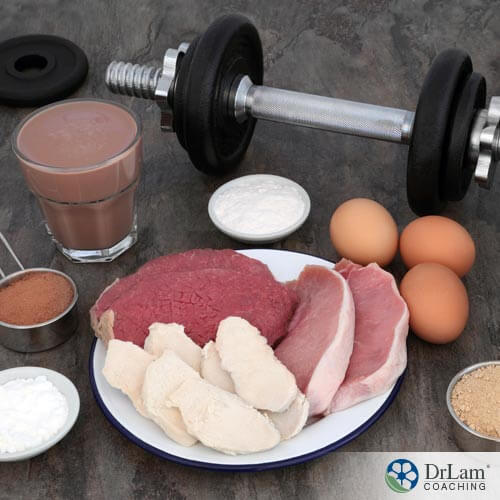When it comes to your nutritional needs, you cannot afford to underestimate the value of protein. You may not realize it, but protein benefits your overall health, most especially your adrenal function. In fact, it allows your body to cope better in times of stress so that you don’t end up getting burned out and suffering from Adrenal Fatigue Syndrome (AFS).
 Along with carbohydrates and fat, protein is classified as a macronutrient. This simply means your body needs a relatively large amount of it to be able to continuously function well.
Along with carbohydrates and fat, protein is classified as a macronutrient. This simply means your body needs a relatively large amount of it to be able to continuously function well.
Proteins are generally made up of several thousands of smaller units called amino acids. Typically, your body would need as many as 20 different amino acids to be able to build cells and keep repairing them. Meanwhile, these amino acids are also used to make other proteins, which then function as enzymes or hormones.
Of the 20 essential amino acids for daily living, however, the body is only capable of producing 11 of these internally. The remaining nine must come from a dietary protein source. The moment you ingest dietary protein, your body breaks it down into individual amino acids. These are then used to build other proteins to support daily living. Some of them are converted into enzymes. Others become incorporated into cells. Meanwhile, there are also proteins that transform into hormones.
Hormones perform several functions critical to your overall health. Some control bone formation. Others regulate heart rate. Then there are those that aid the body in dealing with and overcoming stress. This is done through the body’s adrenal glands.
The adrenal glands may be relatively small, but they are critical to supporting your health and well-being, especially in times of stress. In fact, it is safe to say that your adrenal glands act as the command center for stress response outside of your central nervous system. This is because your adrenals are responsible for the production of cortisol, a hormone that is primarily known as the body’s stress hormone. In fact, cortisol plays an important role in the hormone response part of your body’s NeuroEndoMetabolic (NEM) Stress Response system.
Cortisol is typically involved in various functions. These include the regulation of your blood pressure, the release of insulin to maintain your blood sugar, the metabolism of glucose and the suppression of your immune system. When the body experiences an episode of stress, the adrenals respond by secreting cortisol in the body. Although stress is not always the reason why cortisol gets released in the blood stream, it has been observed that there is higher cortisol secretion when the body is experiencing stress.
In the face of a stressful situation, cortisol initiates your body’s fight-or-flight response. To do this, it performs several functions. These include increasing glucose in the bloodstream by breaking down glucose from stored fat, in order to release more energy.
Meanwhile, cortisol also readily identifies certain functions in the body which are not critical to immediate stress response and proceeds to curb these respective processes. This is why you have an altered immune system response in times of stress. Furthermore, your reproductive system, growth process, and digestive system are also suppressed.
Typically, the amount of cortisol secreted by the adrenal glands becomes significantly reduced as the stress goes away. At the same time, the body’s functions all return to normal. This gives your digestive, reproductive, and immune systems the chance to return to their normal state.
The problem is nowadays, people tend to experience chronic stress, or stress which is unending. When this happens, the body is always in a fight-or-flight response mode. This causes abnormalities in various affected functions throughout your body. Not only that, it also results in a significant imbalance of hormones.
Once the body’s hormone response is disrupted, you would begin to experience fatigue or even exercise intolerance. You may also find that you are suffering from irregularity in your menstruation as your body experiences a disruption in the reproductive function. Your immune system is also severely compromised so that you may easily get sick, catching the common cold even with minimal exposure.
What you don’t realize is that all of these also serve as indications that you are already suffering from adrenal fatigue. Even worse, the symptoms can get much worse if you do nothing to address the underlying problem. Luckily, you can start recovering from adrenal fatigue with the help of protein.
 Today, there is a wide body of research which indicates that protein benefits a person hugely when it comes to preventing and even relieving adrenal fatigue. When cortisol is hard at work during times of stress, it pushes up your body’s energy expenditure to allow you to deliver the fight-or-flight response.
Today, there is a wide body of research which indicates that protein benefits a person hugely when it comes to preventing and even relieving adrenal fatigue. When cortisol is hard at work during times of stress, it pushes up your body’s energy expenditure to allow you to deliver the fight-or-flight response.
What you may not realize is that as this happens, cortisol also proceeds to decrease muscle mass and lean body mass while increasing fat mass to increase your food intake and appetite. In fact, cortisol also affects your body’s metabolic system by reducing protein stores in most of your cells, except the ones in the liver.
During times of chronic stress, cortisol is left to continue regulating these activities for quite some time. In the end, your body will be weaker, with significantly less muscle mass and lean body mass. Even worse, you will also tend to feel more sluggish due to the increase of fat in your body. With protein consumption, you will be able to gradually return your body and your mood to a much healthier state. This is because it has been shown that protein can help improve mood, enhance glucose metabolism, and even enhance cognitive performance.
In fact, one study conducted by several institutions in Australia found that a high protein, low carbohydrate diet is linked to a significant reduction in one’s depression levels. Moreover, it also led to an improvement in one’s self esteem. In addition, a study conducted by Maastricht University in the Netherlands also found that dietary treatment with tryptophan-rich hydrolyzed protein resulted in improved moods and better coping with psychological stress. It also led to a dampened cortisol response when faced with acute stress.
Meanwhile, another study conducted by the Swiss Federal Institute of Technology in Zurich has found that a meal rich in protein can result in improved overall cognitive performance. This is because it is believed that with more protein consumption, there is less variation in one’s glucose metabolism. In contrast, a study that was published in the Journal of Psychiatric Research in 1982 to 1983 found negative effects on one’s concentration after consuming a meal that is high in carbohydrates and low in protein.
As you can see, being able to eat enough protein on a regular basis is critical to promoting good adrenal health. However, it is also important to note that you only experience essential protein benefits if you consume healthy types of protein. To make sure that you always do so, you should be able to readily tell if a protein you are about to include in your meal is of high or low quality.
Especially today, not all protein is created equal. While there are proteins that are healthy and beneficial to the body, there are also protein foods that you are better off avoiding altogether.
Generally, low-quality protein foods refer to processed meats. Although they do have a high protein content, this type of food also tends to contain a significant amount of salt. Especially when consumed regularly, it can trigger high blood pressure in the body and even cause worse health problems. At the same time, consumption of processed meats has also been linked to increased risk of developing cancer. This is largely due to other substances used when processing meat.
 On the other hand, high-quality protein foods refer to organic or grass-fed meat. They are more wholesome than low-quality protein since they are minimally processed before being sold to consumers.
On the other hand, high-quality protein foods refer to organic or grass-fed meat. They are more wholesome than low-quality protein since they are minimally processed before being sold to consumers.
Today, there are several types of high-quality protein that you can choose from. One of the healthiest options is fish as this option is high in protein content and low in harmful saturated fat. At the same time, fish such as herring, trout, salmon, sardines, black cod, and anchovies also contain a good amount of omega-3 fatty acids. Be mindful that fish these days are also laden with toxic heavy metals.
Meanwhile, another healthy protein source is organic poultry meat, such as chicken and turkey. Just be sure to remove the skin before cooking them to avoid consuming too much saturated fat. On the other hand, you can also get healthy, high-quality protein from low fat dairy, beans, non-GMO tofu, seeds and nuts.
Now that you know how to tell high-quality proteins from low-quality, it’s time to determine what kind of protein benefits the body best when it comes to fighting off adrenal fatigue. Just remember that there is always a possibility of having a sensitivity or intolerance to certain foods, so it is always advisable to meet with your physician or have a food allergy test done before you try anything.
That said, there are several ideal proteins that you can incorporate into your daily diet to help avoid suffering from adrenal fatigue. These include foods like lentils, organic pastured eggs, black beans, organic chicken and grass-fed beef. Aside from delivering known protein benefits like increasing lean body mass and muscle mass, some of these foods have also been effective in improving mood. This, in turn, makes it much easier for you to deal with stress.
Now that you know what sort of proteins you should be consuming, it’s time to figure out exactly how much protein you need to be able to keep up with your body’s daily demands.
Generally, an adult should consume around 0.8 grams of protein per kilogram of their body weight every day. That means that if you weigh around 180 pounds, you should consume at least 65 grams worth of healthy, high-quality protein regularly. The best way to ensure you are consuming enough protein is by checking your food’s serving size and referring to a nutritional table to determine its protein content.
 As you can see, protein benefits the body more than you may have originally thought. In fact, protein aids your adrenal glands significantly and even helps prevent adrenal fatigue. Hence, it is highly important for you to make sure you are getting enough protein in your diet on a regular basis. You can consult with your physician or a nutritionist for proper guidance.
As you can see, protein benefits the body more than you may have originally thought. In fact, protein aids your adrenal glands significantly and even helps prevent adrenal fatigue. Hence, it is highly important for you to make sure you are getting enough protein in your diet on a regular basis. You can consult with your physician or a nutritionist for proper guidance.
This way, you are sure that your body will experience all the great protein benefits that it needs. This, in turn, will also improve your ability to deal with stress in the future.
Many may not be aware that protein benefits extend all the way to stress management. Aside from helping you build strong, lean muscles, it also effectively helps bring down your stress levels in case of a tense situation. Studies have also shown that it can be effective in reducing anxiety.
